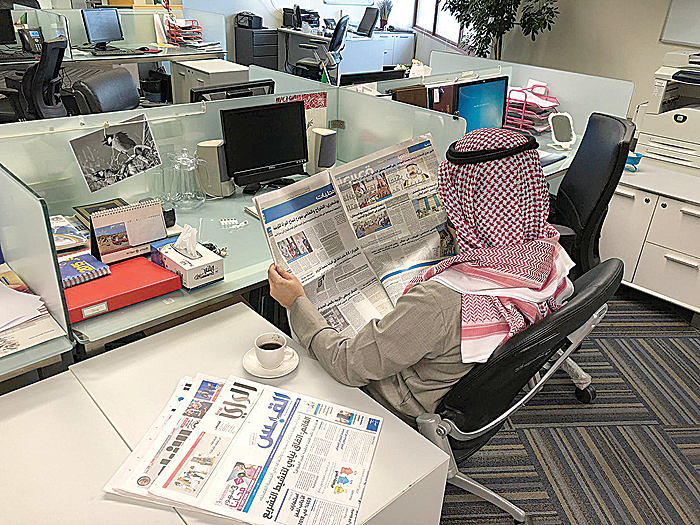Arabic dailies cite little advertisement income, rising cost for step

KUWAIT: The once-a-week newspapers' publication suspension in Kuwait has left the door wide open for speculations that this step would either be recalculations of feasibility of overall paper production or start of transformation to online copies. Journalists however considered the decisions by local Arabic Al-Qabas, Al-Rai, Al-Anbaa and Al-Jarida dailies to stop paper production on Saturdays - following in the footsteps of English dailies - as unjust towards readers who have sentimental attachment to paper copies, who also consider the way they hold and read the paper a daily ritual.
Economic decision
Arab and Western newspapers have been affected by digitization of papers in the past decade, including for example the Christian Science Monitor which stopped paper production in 2009 after circulation dropped to 200,000 copies while its digital copy was read by more than a million people. "This is a 100 percent economic decision aimed at cutting cost," Waleed Al-Nisf, Al-Qabas Chief Editor said, and the newspapers "agreed there are difficulties in competing against electronic means." Nisf also attributed the once-a-week publication suspension to less "advertisement and the economic situation," therefore newspapers decided to stop production for a day as a mean to overcome these troubles.
Nisf said suspension may give newspapers' workers a time to rest "thus have more production while cutting cost. This procedure has been adopted in the US, Europe and other parts of the world, where newspapers have one copy for Saturday and Sunday." He cited a US report suggesting newspapers would vanish by the year 2032, affirming Al-Qabas' plans to strengthen its web-based content . "We have big investment in this domain and we will attract more readers who will pay affordable prices for the service," he said.
Digital copies
Majed Al-Ali, chief editor of Al-Rai Newspaper, said the one-day paper publication suspension would not affect the number of readers because all newspapers have 'digital copies', or news websites where content is updated round-the-clock. Citing international studies conducted in 2018, Ali said they concluded newspapers were more "credible" than the digital copy because they "verified the story before publication, contrary to other means which consider publication speed more important than content or credibility."
Furthermore, Ali said little advertisement income and rising cost caused the one-day production suspension. "Newspapers have been suffering from losses for years, and it is time to rearrange their priorities," he proclaimed
Al-Anbaa Newspaper Chief Editor Yusuf Al-Marzouq brushed aside speculations one-day suspension was a beginning of permanent closure. "The aim is to cut expenses because the whole world is experiencing an economic crisis at all fronts," he said, adding that the number of readers would not be affected because Saturday was a weekend anyway.
Nasser Al-Otaibi, Managing Editor at Al-Jarida Newspaper, who acknowledged newspapers were suffering severe financial issues, said the one-day suspension was not the end of newspapers. "It is too early to talk about closure of newspapers in Kuwait because they are taking serious steps to prevent this," he said. Al-Jarida, he said, would rather develop its paper copy to include more analyses, reports, interviews and features in order to counter the competition posed by the digital media. Otaibi said that Al-Jarida, like other papers, would compensate suspension of publication of its hard copy into its digital copy and social media. Al-Jarida, he noted, was already updating its digital copy and providing most recent stories like the National Assembly sessions.
Daily ritual
A 2016 study by Al-Jazeera Center for Studies showed internet users in the Arab world skyrocketed from 29 million in 2007 to 140 million in 2015, indicating rising number of readers of digital media. "The newspapers represent a daily ritual for a large segment of people specially the senior citizens," said Waleed Al-Holan, a journalist, adding the credibility of newspapers was higher because every story was verified at multiple levels before final print. However, Hanan Al-Zayed, another journalist, said correcting mistakes in digital copies was easy and would not cost anything, contrary to the print papers which would lose further papers. She believed the one-day production suspension "will trigger a social problem, at least at the personal level because people will miss the feeling of papers and sound of flip of pages." Zayed said the smartphones became a gateway for "daily activities which isolate the individual from his or her social environment."
Dr Munawer Al-Rajhi, Head of Mass Communications Department at Kuwait University (KU), said suspension of newspapers' publication on Saturday should have occurred 2-3 years ago. Rajhi, anticipating suspension to include Fridays as well in one or two years, said advertisers would not advertise during holidays. "Therefore, newspapers' owners were forced to stop publication in order to save money."
Abdullah Buftain, a journalist, said the one-day suspension of production was only a start "of the end of newspapers." Abdulwahhab Al-Essa, another journalist, said newspapers were suffering from "electronic revolution," and predicted the papers to continue publications but on a weekly or even monthly basis.
Newspapers are struggling in the face of digital age, but one should not forget many people thought introduction of TV was the end of radio. They were wrong and the radio survived through development of content and introduction of interactive methods that retained its audience. Will newspapers follow suit? Time will tell. - KUNA
.jpg)



